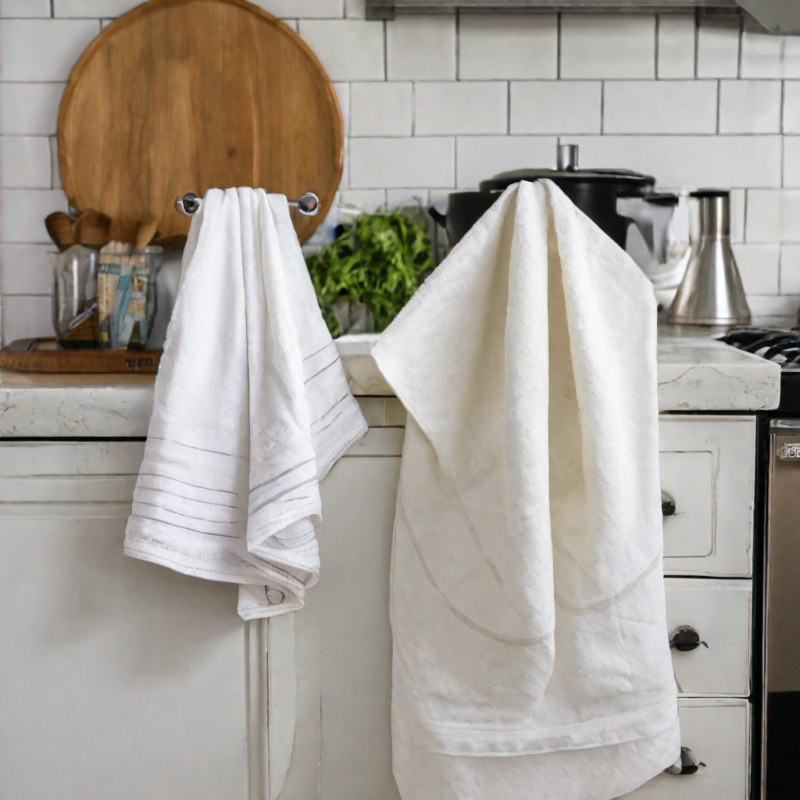Blog
Comparing Flour Sack Towels to Regular Kitchen Towels
Step into the bustling kitchen, where the battle against spills and stains is a daily affair. In this chaotic culinary arena, you seek the perfect ally, a reliable companion that can handle any mess thrown its way.
Enter the flour sack towel, a humble yet mighty contender, ready to outperform regular kitchen towels. Discover the absorbency, durability, cleaning ease, versatility, eco-friendliness, and cost-effectiveness that set these towels apart.
It’s time to elevate your kitchen game with a true champion by your side.
Key Takeaways
- Flour sack towels are more absorbent than regular kitchen towels.
- Flour sack towels are durable and can withstand heavy-duty tasks.
- Cleaning and maintenance of flour sack towels is easy.
- Flour sack towels are versatile, making them useful for various tasks in the kitchen.
Absorbency
You’ll find that flour sack towels are more absorbent than regular kitchen towels. This is because they’re made from a lightweight and tightly woven cotton fabric that allows them to quickly soak up liquids. The open weave of flour sack towels creates more surface area, which enhances their absorbency.
When you use them in the kitchen, you’ll notice that they can easily absorb spills, drips, and even excess moisture from freshly washed fruits and vegetables. Regular kitchen towels, on the other hand, are often made from thicker and less absorbent materials, such as terry cloth or microfiber. While they may still serve their purpose, they aren’t as efficient as flour sack towels when it comes to soaking up liquid messes.
Durability
If you frequently use your kitchen towels for heavy-duty tasks, such as wiping down countertops or drying dishes, you’ll appreciate the durability of flour sack towels. Made from tightly woven cotton fabric, flour sack towels are designed to withstand the rigors of everyday kitchen use.
Here are some reasons why flour sack towels are known for their durability:
- Reinforced stitching: Flour sack towels are often double-stitched along the edges to prevent fraying and ensure longevity.
- Strong fabric: The tightly woven cotton fabric used in flour sack towels is resistant to tears and can withstand repeated use and washing.
- Absorbent yet sturdy: Despite their soft and lightweight feel, flour sack towels are highly absorbent and can handle heavy-duty tasks without losing their shape or effectiveness.
Cleaning and Maintenance
To properly care for your flour sack towels, it’s important to follow a few simple cleaning and maintenance guidelines.
First, always check the care instructions provided by the manufacturer. Most flour sack towels are machine washable, but some may require hand washing or gentle cycles. Use a mild detergent to avoid damaging the fabric.
It’s recommended to avoid using bleach or fabric softener, as they can weaken the fibers and reduce absorbency. After washing, shake out the towels to remove any excess lint or debris. Then, either hang them to air dry or tumble dry on low heat. Avoid high heat settings, as they can shrink the towels.
Versatility
When using flour sack towels, you’ll appreciate their versatility for a variety of tasks in the kitchen. These towels aren’t limited to just drying dishes or wiping countertops. They can be used in many different ways to make your kitchen tasks easier and more efficient.
Here are two ways in which flour sack towels prove their versatility:
- Cooking Aid:
- Use them as a makeshift strainer by lining a colander with a flour sack towel to strain liquids or separate solids.
- Wrap flour sack towels around fresh herbs or vegetables to keep them fresh in the refrigerator.
- Baking Essential:
- Flour sack towels can be used as a proofing cloth for bread, providing the perfect environment for the dough to rise.
- Use them to cover dough or dough-covered containers during the fermentation process, allowing the dough to breathe while protecting it from drying out.
The versatility of flour sack towels makes them an essential tool in any kitchen, offering convenience and practicality for a range of cooking and baking needs.
Eco-Friendliness
You can feel good about using flour sack towels because they’re an eco-friendly option for your kitchen. Unlike regular kitchen towels, which are often made from synthetic materials like polyester or microfiber, flour sack towels are typically made from 100% cotton.
Cotton is a natural and renewable resource that’s biodegradable, meaning it can break down easily in the environment without causing harm. In addition, flour sack towels are often unbleached and free from harsh chemicals, making them a safer choice for both you and the planet.
Cost-Effectiveness
Flour sack towels offer a cost-effective alternative for your kitchen needs. When comparing the cost of flour sack towels to regular kitchen towels, several factors come into play:
- Durability: Flour sack towels are known for their durability and long lifespan. They can withstand frequent use and multiple washes without losing their quality. This means you won’t have to constantly replace them, saving you money in the long run.
- Versatility: Flour sack towels can be used for a variety of purposes in the kitchen, such as drying dishes, cleaning countertops, or even as a makeshift strainer. Their versatility eliminates the need for multiple specialized towels, reducing your overall expenses.
- Absorbency: Flour sack towels are highly absorbent, allowing you to dry dishes more efficiently. This means you can use fewer towels for the same task, resulting in less laundry and lower utility costs.
Conclusion
In conclusion, when comparing flour sack towels to regular kitchen towels, it’s clear that flour sack towels are the superior choice.
Their exceptional absorbency and durability make them a reliable option for any kitchen task.
Additionally, their versatility allows for various uses beyond the kitchen.
Flour sack towels are also environmentally friendly and cost-effective, making them a practical and sustainable option.
So, why settle for regular kitchen towels when you can have the exceptional performance of flour sack towels that will leave you amazed and delighted with their incredible performance?

